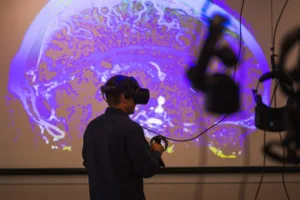In a cutting-edge development, researchers at Colorado State University (CSU) have found that virtual reality (VR) curriculum could be a game-changer for higher education, particularly in the realm of medical science. The study, published in the Medical Science Educator Journal, shows promising results for the future of online learning, as VR courses yield equal or even better outcomes than traditional in-person anatomy labs.
For decades, educators have grappled with implementing technologies and methods that engage a generation raised on on-demand services, realistic video games, and personalized streaming content. The challenge has been particularly acute in technical fields like anatomy, where engaging students without compromising learning outcomes is crucial.
Led by Dr. Tod Clapp, a team of CSU researchers conducted a study comparing student performance in VR-based anatomy labs with that of traditional cadaver labs. The results were striking: students in the VR courses achieved equal or slightly better test scores, and the online content was found to be rigorous and engaging, without impacting examination results negatively.
These findings are particularly timely given that the number of higher education students enrolled in online courses is projected to double within the next 3-4 years. The study offers a beacon of hope for educators who have been skeptical about the quality of training that online education can deliver in hands-on fields like medicine.
Dr. Clapp, who has been using VR in his classroom for five years, was not surprised by the results but believes that the data could persuade other universities to embrace innovation. “This study validates the impact VR can have not just on student engagement, but also outcomes, and the ability to combine outcomes with something students love is every teacher’s dream,” he said.
Perspectus, a Colorado-based startup, provided the technology for the study. CEO Stephen Tober sees the integration of VR in education as the way of the future. “Higher education and healthcare need cost-effective solutions that deliver enhanced results. As proven in the research, our cutting-edge VR technology enables the experts (professors and doctors) to easily customize their own content so that they can teach patients and more effectively prepare the health science students that will become our future clinicians.”
As the demand for engaging, accessible, and outcome-focused education continues to grow, VR technology may just be the solution educators have been searching for. This new frontier in higher education promises not only to keep pace with the demands of today’s students but also to transform the future of learning across disciplines.

